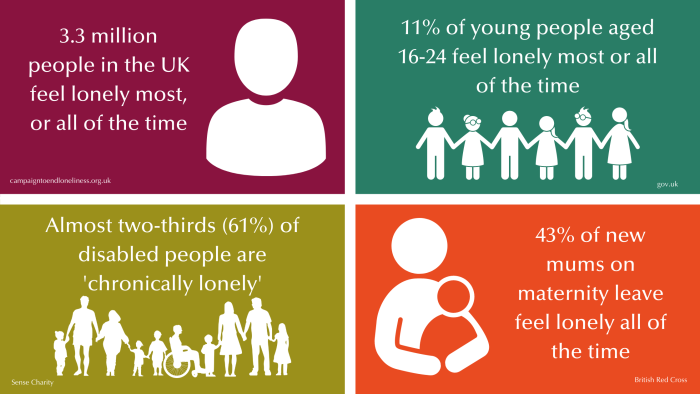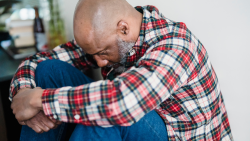That lonely feeling, it’s human nature
Most people of all ages will experience feelings of loneliness at some point in their lives. We’re social creatures – it’s in our nature, and we crave human interaction. But for millions of people, this is something they think about, or something they used to do.
The latest figures from The Campaign to End Loneliness show that in the UK, 3.3 million people feel lonely most, or all of the time. Over three million people!
For most, when we think about people being lonely, we may automatically think of older people. But that’s not necessarily the case. Around one million young people are ‘chronically lonely’, particularly single parents or those living with health issues and disabilities.

Marmalade Trust, the creators of Loneliness Awareness Week (LAW), highlight the importance of understanding loneliness so that we can help ourselves and others to manage and overcome that lonely feeling. They have a great selection of ideas to help people connect, including activities and hobbies, how to get talking, using technology, volunteering, and much more. Their handy practical guides cover how to manage the feeling of loneliness in many sectors of society for many different people:
- Loneliness at work
- Disabilities and loneliness
- Self-employed loneliness
- Loneliness at university, and more…
New research (June 2022) conducted by the Department for Digital, Culture, Media, and Sport (DCMS) and the Department of Health and Social Care has shown that there is a direct two-way link between loneliness and mental health issues. Analysing mental health and the impact of loneliness on mental wellbeing, the study identified that chronic loneliness plays a ‘significant role’ in the onset of new, and the exacerbation of existing, mental health ‘distress’.
“Loneliness can affect all of us and the research published today highlights that young and disabled people, alongside those with long-term health conditions, are disproportionately affected by loneliness. As we start Loneliness Awareness Week, I encourage everyone to reach out to someone they think may be feeling alone or isolated.” – Nigel Huddleston, Minister for Civil Society and Youth
Loneliness Awareness Week
“Loneliness is a natural human emotion. We are hard-wired to need social connection. Feeling lonely is a useful prompt for us to look at how we can better meet our social needs.” Marmalade Trust
 Loneliness Awareness Week is a week dedicated to getting people talking about loneliness and the effects it can have on people and communities, and their health and wellbeing.
Loneliness Awareness Week is a week dedicated to getting people talking about loneliness and the effects it can have on people and communities, and their health and wellbeing.
The theme for this year’s campaign is ‘That lonely feeling’ and aims to reduce the stigma around loneliness – focusing on the fact that it’s a completely natural emotion, it shouldn’t be something to be embarrassed about and we can do something about it. Everyone will feel lonely at some point in their lives, and it affects people of all ages; an important fact to remember – it’s not just older people living on their own who are affected. Everyone needs to make meaningful connections, no matter their age, background, or culture – everyone, and that’s what LAW is about. Getting people talking, interacting, and engaging.
There are some great resources out there to help raise awareness throughout the campaign and beyond, notably the LAW toolkit from Marmalade Trust, Every Mind Matters LAW 22 campaign resources from NHS England, and The Campaign to End Loneliness website.
Reducing loneliness locally
There are many ways that we can help to reduce loneliness which we’ve discussed in our 2019 feature on loneliness and social isolation. Locally, there’s a lot going on, and there are a lot of fantastic voluntary sector groups working hard to reduce loneliness in Stoke-on-Trent and Staffordshire:
- Getting out and about – Door 2 Door is a community transport project managed by VAST, helping residents in Stoke-on-Trent and Newcastle-under-Lyme, helping them to get out and about, to engage with others in their community, to maintain their independence.
- Loneliness: let’s face it together – Saltbox’s CareLink project provides befriending services for older people in Stoke-on-Trent, helping them to build the confidence to forge new friendships and make meaningful connections.
- Small actions make a big difference – Staffordshire County Council’s Doing Our Bit campaign provides information and advice for people of all ages to help manage that lonely feeling and how to help others that may be feeling that way too.
- Bump and beyond: helping new parents – Expecting a baby and becoming a parent should be an exciting time, but for those experiencing hardship, the joy can be overshadowed by feelings of loneliness. Alice Charity uses their group sessions to provide emotional and practical support to expecting and new parents across Stoke-on-Trent and Newcastle-under-Lyme.
- Combatting isolation and loneliness amongst older LGBT+ people – North Midlands LGBT Older Peoples Group provides a safe space to meet others and make new friends, share stories, and take part in physical, social, and cultural activities.
There are many more groups working just as hard and you can find some of them on the Stoke-on-Trent Community Directory. This directory is a huge collection of local health and care services, charities, and community groups that provide help, information, advice, and support across Stoke-on-Trent.
